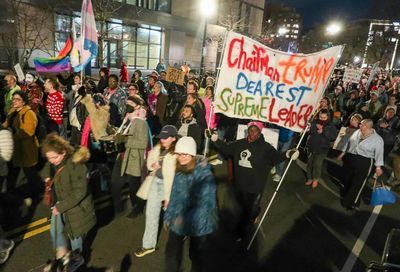Appeals Court Blocks Idaho Transgender Athlete Ban
The 9th Circuit finds law barring transgender athletes from female sports is likely discriminatory and unconstitutional.

A federal appeals court has blocked Idaho from enforcing a first-in-the-nation law barring transgender women and girls from participating on female-designated sports teams.
The 9th U.S. Circuit Court of Appeals has upheld a lower court’s decision to issue an injunction blocking Idaho from enforcing the law, finding that Idaho’s “Fairness in Women’s Sports Act” is likely unconstitutional.
The law, which was signed into effect by Idaho Republican Gov. Brad Little in March 2020, bars transgender women and girls of all ages from competing on female sports teams at public schools and universities in the state.
The law also requires any athlete — regardless of whether they are cisgender or transgender — whose gender identity is called into question to submit to genetic testing and physical exams.
Their primary physician must then submit a signed statement attesting that the athlete is assigned female at birth, along with a detailed report of a student’s “internal and external reproductive anatomy,” their “normal endogenously produced levels of testosterone,” and an analysis of their genetic makeup.
The American Civil Liberties Union brought the lawsuit on behalf of Lindsay Hecox, a transgender athlete who sought to join the women’s track team at Boise State University, and Kayden Hulquist, a then-17-year-old soccer player who is cisgender, but was concerned about being subjected to invasive “sex verification” testing.
Lawyers for the pair argued that the law was unconstitutional because it discriminates against transgender athletes on the basis of both sex and transgender status, and because it subjects only females to “verification testing” to “prove” their gender.
The pair’s lawyers also argued that the law’s provisions could easily be abused by bad actors — as Hulquist feared — either to maliciously sideline talented female players from certain games or matches while they undergo genetic testing (in order for opposing teams to gain a competitive advantage), or simply to discriminate and harass cisgender female athletes who don’t conform to stereotypical gender norms or conventional standards of so-called “beauty.”
Since Idaho passed its law, 21 other states with GOP-led legislatures have adopted nearly identical restrictions on transgender athletes, most recently in North Carolina.
U.S. Circuit Judge Kim McLane Wardlaw, an appointee of former Democratic President Bill Clinton, writing on the court’s behalf, found that the lower court judge who issued the injunction blocking Idaho’s law from being enforced did not abuse his discretion when he ruled that the ban likely violates transgender student-athletes’ right to equal protection under the U.S. Constitution.
Wardlaw also found that the law discriminates against all female-identifying student-athletes on the basis of sex by subjecting only them, and not male athletes, to “invasive” sex verification testing.
“Idaho has not offered any ‘exceedingly persuasive justification’ warranting the imposition of this objectively degrading and disturbing process on young women and girls,” she wrote. “Before the Act’s passage, Idaho had no sex verification process in place and nonetheless separated teams by gender. The record is devoid of evidence that any boy attempted to join a girls’ team.
“By the plain text of the Act, the purpose of the sex verification process is to identify and exclude transgender women and girls from women’s athletics in Idaho. And a ‘bare . . . desire to harm a politically unpopular group cannot constitute a legitimate governmental interest,'” she continued, quoting past court precedents.
“We agree with the district court that, contrary to the Act’s express purpose of ensuring women’s equality and opportunities in sports, the sex dispute verification process likely will discourage the participation of Idaho female students in student athletics by allowing any person to dispute their gender and then subjecting them to unnecessary medical testing and genital inspections,” Wardlaw added.
Circuit Judge Morgan Christen concurred in part and dissented in part, finding that the lower court judge did not abuse his discretion, but arguing that the injunction was overly broad and failed to specify which parts of the act the state should be barred from enforcing.
Christiana Kiefer, a lawyer for the anti-LGBTQ Alliance Defending Freedom, which had intervened in the case on behalf of two athletes who claimed the law was necessary to ensure fairness for cisgender female athletes, criticized the court’s decision.
“When our laws ignore biological reality and allow males to compete in women’s sports, women are harmed and denied athletic opportunities,” Kiefer told Reuters in a statement.
But Wardlaw had noted, in her opinion, that the evidence did not prove that assigned sex at birth alone was determinative of athletic performance.
“While the Intervenors state they were defeated by a transgender athlete, June Eastwood, in a running competition at the University of Montana, Eastwood eventually lost to a different cisgender athlete in that same competition,” she wrote. “Lindsay’s [Hecox’s] own athletic career belies the contention that transgender women who have undergone male puberty have an absolute advantage over cisgender women: she has never qualified for BSU’s track team despite trying out in Fall 2020.”
The ACLU celebrated the victory, which allows the injunction to remain in place while it argues before the lower court that the ban is unconstitutional on its merits.
“This is an important victory for common sense, equality, and the rights of transgender youth under the law,” Chase Strangio, the deputy director for transgender justice at the ACLU’s LGBT & HIV Project, said in a statement. “The court found that transgender athletes like Lindsay face irreparable harm by a ban on their right to participate as who they are and held laws like Idaho’s not only target and discriminate against transgender women and girls but also discriminate against all women and girls.”
Support Metro Weekly’s Journalism
These are challenging times for news organizations. And yet it’s crucial we stay active and provide vital resources and information to both our local readers and the world. So won’t you please take a moment and consider supporting Metro Weekly with a membership? For as little as $5 a month, you can help ensure Metro Weekly magazine and MetroWeekly.com remain free, viable resources as we provide the best, most diverse, culturally-resonant LGBTQ coverage in both the D.C. region and around the world. Memberships come with exclusive perks and discounts, your own personal digital delivery of each week’s magazine (and an archive), access to our Member's Lounge when it launches this fall, and exclusive members-only items like Metro Weekly Membership Mugs and Tote Bags! Check out all our membership levels here and please join us today!
























You must be logged in to post a comment.